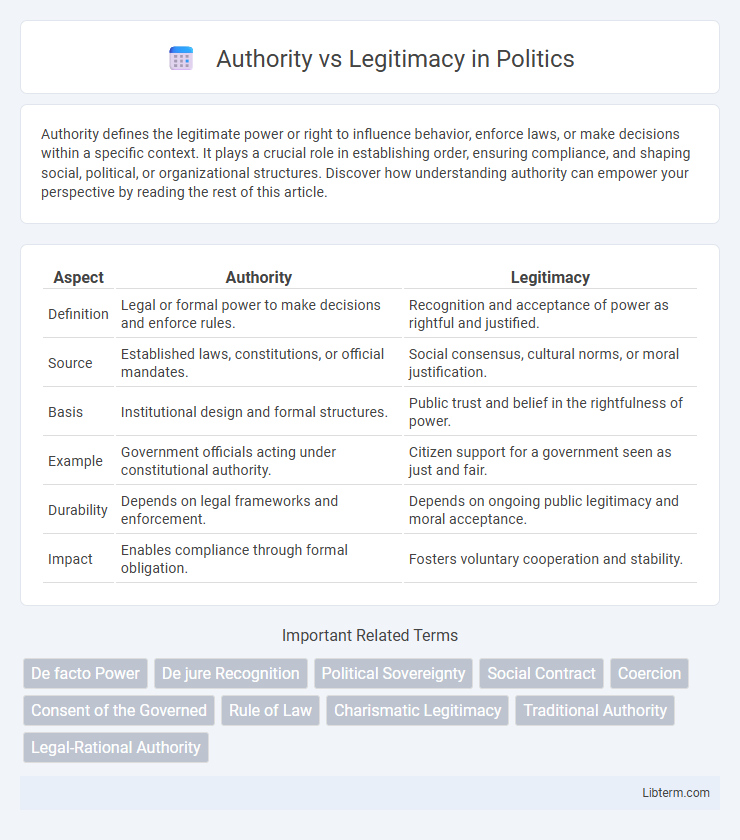Authority defines the legitimate power or right to influence behavior, enforce laws, or make decisions within a specific context. It plays a crucial role in establishing order, ensuring compliance, and shaping social, political, or organizational structures. Discover how understanding authority can empower your perspective by reading the rest of this article.
Table of Comparison
| Aspect | Authority | Legitimacy |
|---|---|---|
| Definition | Legal or formal power to make decisions and enforce rules. | Recognition and acceptance of power as rightful and justified. |
| Source | Established laws, constitutions, or official mandates. | Social consensus, cultural norms, or moral justification. |
| Basis | Institutional design and formal structures. | Public trust and belief in the rightfulness of power. |
| Example | Government officials acting under constitutional authority. | Citizen support for a government seen as just and fair. |
| Durability | Depends on legal frameworks and enforcement. | Depends on ongoing public legitimacy and moral acceptance. |
| Impact | Enables compliance through formal obligation. | Fosters voluntary cooperation and stability. |
Defining Authority: Core Concepts
Authority represents the acknowledged right to exercise power and make decisions within a defined social structure, rooted in recognized positions or roles. It derives legitimacy through established norms, laws, or social contracts that justify the holder's influence and control. Max Weber's typology identifies traditional, charismatic, and legal-rational authority as foundational frameworks explaining how authority gains acceptance and sustains social order.
Understanding Legitimacy: Key Principles
Legitimacy is the recognized right to exercise power, rooted in the consent and belief of the governed, distinguishing it from mere authority, which is formal power granted by law or position. Key principles of legitimacy include transparency, fairness, and alignment with societal values, ensuring that rulers or institutions maintain public trust and compliance. Understanding legitimacy involves analyzing how institutions gain moral approval, sustain stability, and foster long-term governance through voluntary acceptance rather than coercion.
Historical Perspectives on Authority and Legitimacy
Historical perspectives on authority and legitimacy reveal the evolution of power structures from divine right monarchies to modern constitutional states. Medieval rulers claimed authority through religious sanction, while Enlightenment thinkers shifted legitimacy toward social contracts and popular sovereignty. This transition highlights the changing foundations of political power and the increasing emphasis on consent and legality in governance.
Sources of Authority in Society
Authority in society stems from recognized sources such as legal-rational frameworks, traditional customs, and charismatic leadership, each providing different grounds for exercising power. Legal-rational authority derives legitimacy from established laws and institutional rules, ensuring predictable governance. Traditional authority is rooted in longstanding cultural practices and social structures, while charismatic authority depends on the personal qualities and influence of an individual leader.
Foundations of Political Legitimacy
Foundations of political legitimacy rest on the recognized right of a governing body to exercise authority, grounded in laws, traditions, or social contracts that reflect the consent of the governed. Authority becomes legitimate when the governed perceive the exercise of power as justifiable and in line with established norms, ensuring compliance without coercion. Factors such as legal-rational frameworks, democratic participation, and cultural legitimacy contribute to the stability and acceptance of political authority.
The Interplay Between Authority and Legitimacy
Authority derives from recognized power within a structured system, while legitimacy stems from the perception of rightful exercise of that power by individuals or institutions. Legitimacy reinforces authority by securing public trust and voluntary compliance, thus enabling effective governance without coercion. The dynamic interplay between authority and legitimacy shapes social order, influencing political stability and institutional effectiveness across diverse contexts.
Authority Without Legitimacy: Risks and Consequences
Authority without legitimacy leads to increased social unrest, as people resist or undermine power perceived as unjust or imposed. Such authority faces challenges like widespread non-compliance, protests, and even rebellion due to lack of moral or legal foundation. The erosion of trust between rulers and the ruled often destabilizes institutions and weakens governance effectiveness.
Building and Maintaining Legitimate Authority
Building and maintaining legitimate authority requires consistent adherence to ethical standards that align with societal values and legal frameworks, fostering trust and cooperation among stakeholders. Transparent decision-making processes and accountability mechanisms enhance perceived legitimacy, strengthening the authority's influence and stability. Regular engagement with the community and responsiveness to feedback ensure authority remains relevant and respected, preventing erosion of legitimacy over time.
Case Studies: Authority vs Legitimacy in Modern Governance
Case studies in modern governance reveal the complex interplay between authority and legitimacy, exemplified by countries like Venezuela, where government authority persists despite widespread challenges to its legitimacy. In contrast, Germany's post-war democratic institutions illustrate how legitimacy derived from constitutional frameworks reinforces authoritative governance. These examples highlight that legitimacy, rooted in legal frameworks and public consent, underpins sustainable authority in contemporary political systems.
Relevance of Authority and Legitimacy in Contemporary Politics
Authority and legitimacy are fundamental to maintaining political order and public compliance in contemporary politics. Authority, as recognized power, ensures decisions are executed effectively, while legitimacy, derived from citizens' acceptance, sustains the government's moral right to rule. The relevance of both concepts is evident in democratic systems where elected officials depend on legitimacy for stability, and authoritarian regimes emphasize authority to enforce control.
Authority Infographic

 libterm.com
libterm.com